A Systematic Review of Research on Personalized Learning: Personalized by Whom, to What, How, and for What Purpose(s)?

Teachers, schools, districts, states, and technology developers endeavor to personalize learning experiences for students, but definitions of personalized learning (PL) vary and designs often span multiple components. Variability in definition and implementation complicate the study of PL and the ways that designs can leverage student characteristics to reliably achieve targeted learning outcomes. We document the diversity of definitions of PL that guide implementation in educational settings and review relevant educational theories that could inform design and implementation. We then report on a systematic review of empirical studies of personalized learning using PRISMA guidelines. We identified 376 unique studies that investigated one or more PL design features and appraised this corpus to determine (1) who studies personalized learning; (2) with whom, and in what contexts; and (3) with focus on what learner characteristics, instructional design approaches, and learning outcomes. Results suggest that PL research is led by researchers in education, computer science, engineering, and other disciplines, and that the focus of their PL designs differs by the learner characteristics and targeted outcomes they prioritize. We further observed that research tends to proceed without a priori theoretical conceptualization, but also that designs often implicitly align to assumptions posed by extant theories of learning. We propose that a theoretically guided approach to the design and study of PL can organize efforts to evaluate the practice, and forming an explicit theory of change can improve the likelihood that efforts to personalize learning achieve their aims. We propose a theory-guided method for the design of PL and recommend research methods that can parse the effects obtained by individual design features within the “many-to-many-to-many” designs that characterize PL in practice.
This is a preview of subscription content, log in via an institution to check access.
Access this article
Subscribe and save
Springer+ Basic
€32.70 /Month
- Get 10 units per month
- Download Article/Chapter or eBook
- 1 Unit = 1 Article or 1 Chapter
- Cancel anytime
Buy Now
Price includes VAT (France)
Instant access to the full article PDF.
Rent this article via DeepDyve
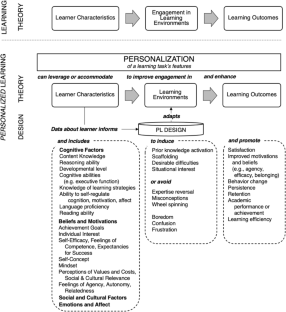
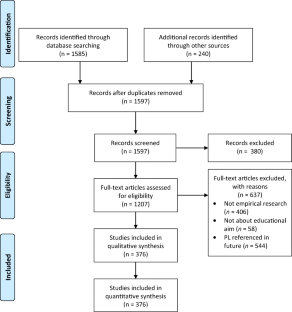
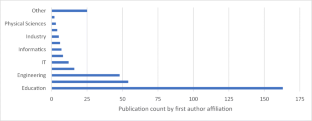
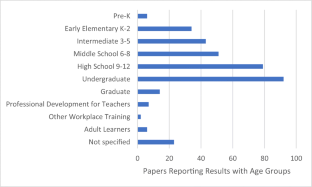
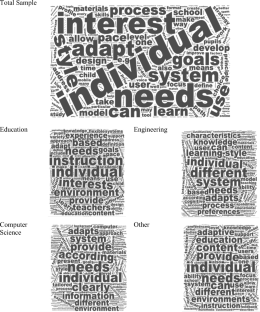

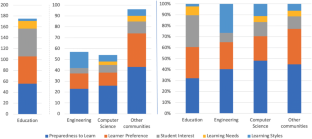
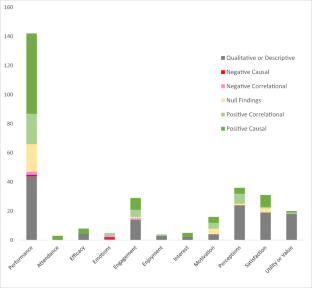
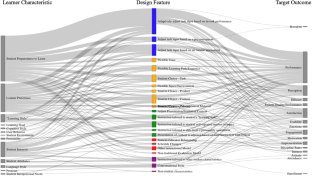

Similar content being viewed by others
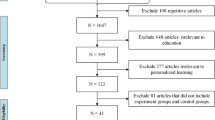
The effectiveness of technology-facilitated personalized learning on learning achievements and learning perceptions: a meta-analysis
Article 20 May 2022

Learning Technology Models that Support Personalization within Blended Learning Environments in Higher Education
Article 31 July 2020

Adapting for a Personalized Learning Experience
Chapter © 2013
Explore related subjects
References
- Aleven, V., McLaren, B., Roll, I., & Koedinger, K. (2006). Toward meta-cognitive tutoring: a model of help seeking with a Cognitive Tutor. International Journal of Artificial Intelligence in Education, 16(2), 101–128. Google Scholar
- Aleven, V., Beal, C. R., & Graesser, A. C. (2013). Introduction to the special issue on advanced learning technologies. Journal of Educational Psychology, 105(4), 929–931. ArticleGoogle Scholar
- Aleven, V., McLaughlin, E. A., Glenn, R. A., & Koedinger, K. R. (2017). Instruction based on adaptive learning technologies. In R. E. Mayer & P. Alexander (Eds.), Handbook of Research on Learning and Instruction (2nd ed., pp. 522–560). Routledge.
- Alli, N., Rajan, R., & Ratliff, G. (2016). How personalized learning unlocks student success. Educause Review, 50(2), 12–21. Google Scholar
- Anderson, J. R. (1983). The architecture of cognition. Harvard University Press.
- Anderson, J. R., Corbett, A. T., Koedinger, K. R., & Pelletier, R. (1995). Cognitive tutors: lessons learned. The Journal of the Learning Sciences, 4(2), 167–207. ArticleGoogle Scholar
- Anderson, J. R., Matessa, M., & Lebiere, C. (1997). ACT-R: a theory of higher level cognition and its relation to visual attention. Human–Computer Interaction, 12(4), 439–462. ArticleGoogle Scholar
- Armstrong, C. M. J., Hustvedt, G., LeHew, M. L. A., Anderson, B. G., & Connell, K. Y. H. (2016). When the informal is the formal, the implicit is the explicit: holistic sustainability education at Green Mountain College. International Journal of Sustainability in Higher Education, 17(6), 756–775. ArticleGoogle Scholar
- Arroyo, I., Royer, J. M., & Woolf, B. P. (2011). Using an intelligent tutor and math fluency training to improve math performance. International Journal of Artificial Intelligence in Education, 21(1-2), 135–152. Google Scholar
- Arroyo, I., Woolf, B. P., Burelson, W., Muldner, K., Rai, D., & Tai, M. (2014). A multimedia adaptive tutoring system for mathematics that addresses cognition, metacognition and affect. International Journal of Artificial Intelligence in Education, 24(4), 387–426.
- Bandura, A. (1986). Social foundations of thought and action: a social cognitive theory. Prentice-Hall.
- Beese, E. B. (2019). A process perspective on research and design issues in educational personalization. Theory and Research in Education, 17(3), 253–279. ArticleGoogle Scholar
- Bernacki, M. L., & Walkington, C. (2018). The role of situational interest in personalized learning. Journal of Educational Psychology, 110(6), 864–881. https://doi.org/10.1037/edu0000250. ArticleGoogle Scholar
- Bill, & Melinda Gates Foundation. (2015). Personalized learning: what is it?. Retrieved online at https://k12education.gatesfoundation.org/download/?Num=2340& filename=Personalized-Learning-What-is-it.pdf
- Block, J. H., & Burns, R. B. (1976). Mastery learning. Review of Research in Education, 4, 3–49. Google Scholar
- Bray, B., & McClaskey, K. (2014). Make learning personal: the what, who, wow, where, and why. Corwin Press.
- Brehm, S. S., & Brehm, J. W. (2013). Psychological reactance: a theory of freedom and control. Academic Press.
- Brown, M., McCormack, M., Reeves, J., Brook, D. C., Grajek, S., & Alexander, B. (2020). Educause Horizon Report Teaching and Learning Edition. EDUCAUSE.
- Bruner, J. S. (1966). Toward a Theory of Instruction (Vol. 59). Harvard University Press.
- Cakir, O., & Simsek, N. (2010). A comparative analysis of the effects of computer and paper-based personalization on student achievement. Computers & Education, 55(4), 1524–1531. https://doi.org/10.1016/j.compedu.2010.06.018. ArticleGoogle Scholar
- Canning, E. A., Priniski, S. J., & Harackiewicz, J. M. (2019). Unintended consequences of framing a utility-value intervention in two-year colleges. Learning and Instruction, 62, 37–48. ArticleGoogle Scholar
- Chan Zuckerberg Initiative. (2020). Education overview. Retrieved from https://chanzuckerberg.com/education/
- Clark, R. E., & Estes, F. (1996). Cognitive task analysis for training. International Journal of Educational Research, 25(5), 403–417. ArticleGoogle Scholar
- Cordova, D. I., & Lepper, M. R. (1996). Intrinsic motivation and the process of learning: beneficial effects of contextualization, personalization, and choice. Journal of Educational Psychology, 88(4), 715–730. ArticleGoogle Scholar
- Cuban, L. (2018). Second draft: a continuum of personalized learning. Larry Cuban on School Reform and Classroom Practice, 27 September. Available at: https://larrycuban.wordpress.com. Accessed 5 Feb 2020.
- Deci, E. L., & Ryan, R. M. (2000). The “what” and “why” of goal pursuits: human needs and the self-determination of behavior. Psychological Inquiry, 11(4), 227–268. ArticleGoogle Scholar
- Drumheller, S. J. (1971). Handbook of Curriculum Design for Individualized Instruction: A Systems Approach; how to Develop Curriculum Materials from Rigorously Defined Behavioral Objectives. Educational Technology Publications.
- Durik, A. M., & Harackiewicz, J. M. (2007). Different strokes for different folks: how individual interest moderates the effects of situational factors on task interest. Journal of Educational Psychology, 99(3), 597–610. ArticleGoogle Scholar
- Eccles, J. S., & Wigfield, A. (2020). From expectancy-value theory to situated expectancy-value theory: a developmental, social cognitive, and sociocultural perspective on motivation. Contemporary Educational Psychology, 101859.
- Eduvate Rhode Island. (2017). Creating a shared understanding of personalized learning for Rhode Island. Retrieved from http://eduvateri.org/projects/personalized/personalizedlearningpaper/
- Elliot, A. J. (1999). Approach and avoidance motivation and achievement goals. Educational Psychologist, 34(3), 169–189. ArticleGoogle Scholar
- Ellis, G. (2009). Grand challenges for engineering. IEEE Engineering Management Review, 37(1), 3-3. National Academy Press. Retrieved from www.engineeringchallenges.org/cms/8996/9127.aspx
- Enyedy, N. (2014). Personalized instruction: new interest, old rhetoric, limited results, and the need for a new direction for computer-mediated learning. National Education Policy Center.
- Esteban-Guitart, M., & Moll, L. C. (2014). Funds of identity: a new concept based on the funds of knowledge approach. Culture & Psychology, 20(1), 31–48. ArticleGoogle Scholar
- Feldstein, M., & Hill, P. (2016). Personalized learning: what it really is and why it really matters. EDUCAUSE Review, 51(2), 24–35. Google Scholar
- Ferguson, D. L., Ginevra, R., Meyer, G., et al. (2001). Designing personalized learning for every student. Association for Supervision and Curriculum Development.
- Gong, Y., Wang, Y., & Beck, J. (2016). How long must we spin our wheels? Analysis of student time and classifier inaccuracy. In Proceedings of the 9th International Conference on Educational Data Mining. ACM.
- González, N., Moll, L. C., & Amanti, C. (2006). Funds of knowledge: theorizing practices in households, communities, and classrooms. Routledge.
- Gonzalez, O., MacKinnon, D. P., & Muniz, F. B. (2020). Extrinsic convergent validity evidence to prevent jingle and jangle fallacies. Multivariate Behavioral Research, 56(1), 3–19. https://doi.org/10.1080/00273171.2019.1707061. ArticleGoogle Scholar
- Grant, P., & Basye, D. (2014). Personalized learning: a guide for engaging students with technology. International Society for Technology in Education.
- Great Schools Partnership. (2015). Personalized learning. The Glossary of Education Reform. Available at: https://www.edglossary.org/personalized-learning/. Accessed 31 May 2018.
- Haas, B. J. (2016). IWitness and student empathy: perspectives from USC Shoah Foundation Master Teachers. In Dissertation Abstracts International Section A: Humanities and Social Sciences. ProQuest Information & Learning.
- Halkyard, S. (2012). The separate and collective effects of personalization, personification, and gender on learning with multimedia chemistry instructional materials. ProQuest LLC..
- Halverson, R. (2019) Taking a learning sciences perspective to understand personalized learning in schools. Presentation at the 2019 Annual Meeting of the American Educational Research Association. Toronto, Canada.
- Harley, J. M., Lajoie, S. P., Frasson, C., & Hall, N. C. (2017). Developing emotion-aware, advanced learning technologies: a taxonomy of approaches and features. International Journal of Artificial Intelligence in Education, 27(2), 268–297. ArticleGoogle Scholar
- Herold, B. (2017). The case (s) against personalized learning. Education Week, 37(12), 4–5. Google Scholar
- Hidi, S., & Renninger, K. (2006). The four-phase model of interest development. Educational Psychologist, 41(2), 111–127. ArticleGoogle Scholar
- Høgheim, S., & Reber, R. (2015). Supporting interest of middle school students in mathematics through context personalization and example choice. Contemporary Educational Psychology, 42, 17–25. ArticleGoogle Scholar
- Holstein, K., Aleven, V., & Rummel, N. (2020). A conceptual framework for human-AI hybrid adaptivity in education. In I. Bittencourt, M. Cukurova, K. Muldner, R. Luckin, & E. Millán (Eds.), Proceedings, 21th International Conference on Artificial Intelligence in Education, AIED 2020 (pp. 240–254). Springer. https://doi.org/10.1007/978-3-030-52237-7_20.
- Hulleman, C. S., Godes, O., Hendricks, B. L., & Harackiewicz, J. M. (2010). Enhancing interest and performance with a utility value intervention. Journal of Educational Psychology, 102(4), 880–895. ArticleGoogle Scholar
- Hulleman, C. S., Kosovich, J. J., Barron, K. E., & Daniel, D. B. (2017). Making connections: Replicating and extending the utility value intervention in the classroom. Journal of Educational Psychology, 109(3), 387–404. ArticleGoogle Scholar
- Institute for Educational Sciences. (2020). Request for applications, education research grant program. CFDA Number: 84.305A U.S. Department of Education
- Järvelä, S. (2006). Personalised learning? New insights into fostering learning capacity. Personalising education, (pp. 31–46). OECD. https://www.oecd.org/site/schoolingfortomorrowknowledgebase/themes/demand/41176687.pdf.
- Kallio, J. M., & Halverson, R. R. (2020). Distributed leadership for personalized learning. Journal of Research on Technology in Education.
- Kalyuga, S. (2007). Expertise reversal effect and its implications for learner-tailored instruction. Educational Psychology Review, 19(4), 509–539. https://doi.org/10.1007/s10648-007-9054-3. ArticleGoogle Scholar
- Kirschner, P. A. (2017). Stop propagating the learning styles myth. Computers & Education, 106, 166–171. ArticleGoogle Scholar
- Kirschner, P. A., & van Merrienboer, J. G. (2013). Do learners really know best? Urban legends in education. Educational Psychologist, 48(3), 169–183. https://doi.org/10.1080/00461520.2013.804395. ArticleGoogle Scholar
- Kleinman, C. (2018). Improving second language lexical acquisition through personalization and contextualization: a look at intrinsic cognitive load reduction strategies. Dissertation Abstracts International Section A: Humanities and Social Sciences. ProQuest Information & Learning.
- Koedinger, K. R., & Aleven, V. (2007). Exploring the assistance dilemma in experiments with cognitive tutors. Educational Psychology Review, 19(3), 239–264. ArticleGoogle Scholar
- Kulik, J. A., & Fletcher, J. D. (2016). Effectiveness of intelligent tutoring systems: a meta-analytic review. Review of Educational Research, 86(1), 42–78. ArticleGoogle Scholar
- Lazowski, R. A., & Hulleman, C. S. (2016). Motivation interventions in education: a meta-analytic review. Review of Educational Research, 86(2), 602–640. ArticleGoogle Scholar
- Liberati, A., Altman, D. G., Tetzlaff, J., Mulrow, C., Gøtzsche, P. C., Ioannidis, J. P., et al. (2009). The PRISMA statement for reporting systematic reviews and meta-analyses of studies that evaluate health care interventions: explanation and elaboration. Annals of internal medicine, 151(4), W-65. ArticleGoogle Scholar
- Lipsey, M. W., & Wilson, D. B. (2001). Practical meta-analysis. SAGE publications, Inc.
- Long, Y., & Aleven, V. (2011). Students’ understanding of their student model. In Proceedings of the International Conference on Artificial Intelligence in Education (pp. 179–186). Springer.
- Mayer, R. E. (2014). Cambridge Handbook of Multimedia Learning (Second Edition). Cambridge University Press.
- McCarthy, B., & Liu. (2020). Strengths-based blended personalized learning: an impact study using a virtual comparison group. Journal of Research on Technology in Education.
- McHugh, D., Shaw, S., Moore, T. R., Ye, L. Z., Romero-Masters, P., & Halverson, R. (2020). Uncovering themes in personalized learning: using natural language processing to analyze school interviews. Journal of Research on Technology in Education.
- Moll, L. C., Amanti, C., Neff, D., & Gonzalez, N. (1992). Funds of knowledge for teaching: using a qualitative approach to connect homes and classrooms. Theory into Practice, 31(2), 132–141. ArticleGoogle Scholar
- Ostrow, K. S., & Heffernan, N. T. (2016). Studying learning at scale with the ASSISTments TestBed. In Proceedings of the Third (2016) ACM Conference on Learning@ Scale (pp. 333–334).
- Pane, J. F., Steiner, E., Baird, M. & Hamilton, L. (2015). Continued progress: promising evidence on personalized learning. Retrieved from http://k12education.gatesfoundation.org/wp-content/uploads/2015/11/Gates-ContinuedProgress-Nov13.pdf
- Pashler, H., McDaniel, M., Rohrer, D., & Bjork, R. (2008). Learning styles: concepts and evidence. Psychological science in the public interest, 9(3), 105–119. ArticleGoogle Scholar
- Patall, E. A., Cooper, H., & Robinson, J. C. (2008). The effects of choice on intrinsic motivation and related outcomes: a meta-analysis of research findings. Psychological Bulletin, 134(2), 270–300. https://doi.org/10.1037/0033-2909.134.2.270. ArticleGoogle Scholar
- Patrick, S., Kennedy, K., & Powell, A. (2013). Mean what you say: defining and integrating personalized, blended and competency education. International Association for K-12 Online Learning.
- Pekrun, R., & Perry, R. P. (2014). Control-value theory of achievement emotions. In International Handbook of Emotions in Education (pp. 130–151). Routledge.
- Plass, J. (2020). Towards a taxonomy of adaptivity for learning. Journal of Research on Technology in Education.
- Plass, J. L., & Kaplan, U. (2016). Emotional design in digital media for learning. In Emotions, technology, design, and learning (pp. 131–161). Academic Press.
- Plass, J., & Pawar, S. (2020). Adaptivity and personalization in game-based learning. In Handbook of Game-based Learning (p. 263). Cambridge: MIT Press.
- RAND Corporation. (2014). Early progress: interim report on personalized learning. RAND Corporation Retrieved from http://k12education.gatesfoundation.org/resource/early-progress-interim-research-on-personalized-learning/.
- Reigeluth, C. M., Aslan, S., Chen, Z., Dutta, P., Huh, Y., Lee, D., & Watson, S. L. (2015). Personalized integrated educational system: technology functions for the learner-centered paradigm of education. Journal of Educational Computing Research, 53(3), 459–496. ArticleGoogle Scholar
- Rothwell, W. J., & Kazanas, H. C. (2011). Mastering the instructional design process: a systematic approach. John Wiley & Sons.
- Salden, R., C. M, Aleven, V., Schwonke, R., & Renkl, A. (2010). The expertise reversal effect and worked examples in tutored problem solving. Instructional Science, 38(3), 289–307. https://doi.org/10.1007/sl1251-009-9107-8. ArticleGoogle Scholar
- Sales, A., Botelho, A. F., Patikorn, T., & Heffernan, N. T. (2018). Using big data to sharpen design-based inference in A/B tests. In K. A. Boyer & M. Yudelson (Eds.), Proceedings of the Eleventh International Conference on Educational Data Mining. Buffalo, NY.
- Scanlon, E., Anastopoulou, S., Kerawalla, L., & Mulholland, P. (2011). How technology resources can be used to represent personal inquiry and support students’ understanding of it across contexts. Journal of Computer Assisted Learning, 27(6), 516–529.
- Shulman, D. (2016). Personalized learning: toward a grand unifying theory. EDUCAUSE Review, 51(2), 10. Google Scholar
- Slavin, R. E. (1984). Team assisted individualization: cooperative learning and individualized instruction in the mainstreamed classroom. Remedial and Special Education, 5(6), 33–42. ArticleGoogle Scholar
- Soares, L. (2011). The “personalization” of higher education: using technology to enhance the college experience. Retrieved from Center for American Progress website:http://www.americanprogress.org/issues/labor/report/2011/10/04/10484/the-personalization-of-higher-education.
- SRI International. (2018). Using technology to personalize learning in K–12 schools. SRI International, Menlo Park, CA. Available from https://www.sri.com/work/publications/using-technology-personalize-learning-k-12- schools.
- Stamper, J.C., Lomas, D., Ching, D., Ritter, S., Koedinger, K. R., & Steinhart, J. (2012). The rise of the super experiment. Proceedings of the Annual Meeting of the International Educational Data Mining Society (EDM) (5th, Chania, Greece, Jun 19-21, 2012)
- Subban, P. (2006). Differentiated instruction: a research basis. International Education Journal, 7(7), 935–947. Google Scholar
- Sweller, J. (2011). Cognitive load theory. In Psychology of Learning and Motivation (Vol. 55, pp. 37–76). Academic Press.
- Tomlinson, C. A. (1999). Mapping a route toward differentiated instruction. Educational Leadership, 57, 12–17. Google Scholar
- Tsybulsky, D. (2020). Digital curation for promoting personalized learning: A study of secondary-school science students’ learning experiences. Journal of Research onTechnology in Education, 52(3), 429–440. Google Scholar
- Turner, J. C., Christensen, A., & Meyer, D. K. (2009). Teachers’ beliefs about student learning and motivation. In L. J. Saha & A. G. Dworkin (Eds.), International Handbook of Research on Teachers and Teaching. Springer International Handbooks of Education (Vol. 21). Springer. https://doi.org/10.1007/978-0-387-73317-3_23.
- U.S. Department of Education. (2010). Transforming American Education: learning powered by technology. Office of Educational Technology, Washington, D.C. http://www.ed.gov/sites/default/files/netp2010.pdf
- U.S. Department of Education. (2016). Future ready learning: reimagining the role of technology in education. Office of Educational Technology, Washington, D.C. http://tech.ed.gov/files/2015/12/NETP16.pdf
- Vignare, K., Lammers Cole, E., Greenwood, J., Buchan, T., Tesene, M., DeGruyter, J., Carter, D., Luke, R., O’Sullivan, P., Berg, K., Johnson, D., & Kruse, S. (2018). A guide for implementing adaptive courseware: from planning through scaling. Joint publication of Association of Public and Landgrant Universities and Every Learner Everywhere.
- Walkington, C. A. (2013). Using adaptive learning technologies to personalize instruction to student interests: The impact of relevant contexts on performance and learning outcomes. Journal of Educational Psychology, 105(4), 932. ArticleGoogle Scholar
- Walkington, C., & Bernacki, M. L. (2014). Motivating students by “personalizing” learning around individual interests: A consideration of theory, design, and implementation issues. In S. Karabenick & T. Urdan (Eds.), Advances in motivation and achievement (vol. 18, pp. 139–176). Emerald.
- Walkington, C., & Bernacki, M. L. (2015). Students authoring personalized "algebra stories" : problem-posing in the context of out-of-school interests. Journal of Mathematical Behavior, 40(B), 171–191. https://doi.org/10.1016/j.jmathb.2015.08.001. ArticleGoogle Scholar
- Walkington, C., & Bernacki, M. L. (2018). Personalization of instruction: design dimensions and implications for cognition. Journal of Experimental Education, 86(1), 50–68. https://doi.org/10.1080/00220973.2017.1380590. ArticleGoogle Scholar
- Walkington, C., & Bernacki, M. L. (2019). Personalizing algebra to students’ individual interests in an intelligent tutoring system: how moderators of impact. Journal of Artificial Intelligence in Education, 29, 58–88. https://doi.org/10.1007/s40593-018-0168-1. ArticleGoogle Scholar
- Walkington, C. W., & Bernacki, M. L. (2020). Appraising research on personalized learning: definitions, theoretical alignment, advancements, and future directions. Journal of Research on Technology in Education, 52(3), 235–252. https://doi.org/10.1080/15391523.2020.1747757. ArticleGoogle Scholar
- Walkington, C. & Bernacki, M.L. (2021). Personalizing classroom learning. [Policy Brief]. University of Nevada Las Vegas. American Psychological Association, Division 15. https://apadiv15.org/making-classroom-learning-personalized/.
- What Works Clearinghouse. (2020). What Works Clearinghouse Standards Handbook, Version 4.1. Washington, DC: U.S. Department of Education, Institute of Education Sciences, National Center for Education Evaluation and Regional Assistance. This report is available on the What Works Clearinghouse website at https://ies.ed.gov/ncee/wwc/handbooks.
- Willingham, D. T., Hughes, E. M., & Dobolyi, D. G. (2015). The scientific status of learning styles theories. Teaching of Psychology, 42(3), 266–271. ArticleGoogle Scholar
- Xie, H., Chu, H. C., Hwang, G. J., & Wang, C. C. (2019). Trends and development in technology-enhanced adaptive/personalized learning: a systematic review of journal publications from 2007 to 2017. Computers & Education, 140, 103599. ArticleGoogle Scholar
- Zhang, L., Yang, S., & Carter, R. A. (2020). Personalized learning and ESSA: what we know and where we go. Journal of Research on Technology in Education, 52(3), 253–274. ArticleGoogle Scholar
- Zimmerman, B. J., & Schunk, D. H. (2011). Handbook of Self-Regulation of Learning and Performance. Routledge.
Acknowledgements
The authors wish to thank Candace Walkington, who provided feedback on a prior version of the manuscript.
Availability of Data and Material
Included in Supplemental Tables. Additional materials available upon request.
Code Availability
Funding
This material is based on work supported by the National Science Foundation under Award DRL 1851680. Any opinions, findings, and conclusions or recommendations expressed in this material are those of the author(s) and do not necessarily reflect the views of the National Science Foundation.
Author information
Authors and Affiliations
- University of North Carolina at Chapel Hill, Chapel Hill, USA Matthew L. Bernacki & Meghan J. Greene
- Carnegie Mellon University, Pittsburgh, USA Nikki G. Lobczowski
- Matthew L. Bernacki













